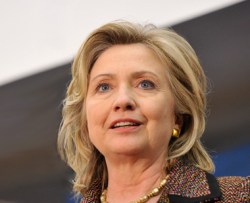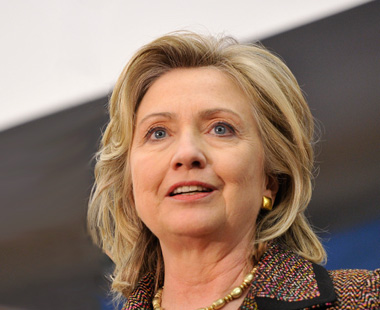
The interplay of diplomacy and energy is a long-standing and evolving one. When most international borders were first drawn, oil hadn’t been discovered. Huge coal seams lay underground, unseen. As the world has evolved, access to energy resources has become a massive source of international conflict. But the U.S. keeps the two issues housed separately. State. Energy.
Which is why Secretary of State Hillary Clinton’s speech at Georgetown University yesterday was so revelatory. Smart and specific, the address pointed out the urgency of addressing global energy issues from a diplomatic perspective and offered strategies to do so. And it called clearly for action on climate change. (Clinton’s full speech is definitely worth a scan, though some excerpts are below. ThinkProgress’ recap is long, but thorough.)
Clinton started by outlining why the topic is important.
Energy matters to America’s foreign policy for three fundamental reasons. First, it rests at the core of geopolitics, because fundamentally, energy is an issue of wealth and power, which means it can be both a source of conflict and cooperation. …
Second, energy is essential to how we will power our economy and manage our environment in the 21st century. We therefore have an interest in promoting new technologies and sources of energy — especially including renewables — to reduce pollution, to diversify the global energy supply, to create jobs, and to address the very real threat of climate change.
And third, energy is key to economic development and political stability. And we have an interest in helping the 1.3 billion people worldwide who don’t have access to energy. We believe the more they can access power, the better their chances of starting businesses, educating their children, increasing their incomes, joining the global economy — all of which is good for them and for us.
Emphasis added. You don’t often see that kind of talk about climate change from a government official, so let’s celebrate when we do.
Clinton also articulated what she called “the three pillars of our global energy strategy.” The first is energy diplomacy, acting as an intermediary force to resolve energy issues.
[S]ome of our energy diplomacy is focused on remote areas like the Arctic, a frontier of unexplored oil and gas deposits, and a potential environmental catastrophe. The melting icecaps are opening new drilling opportunities as well as new maritime routes, so it’s critical that we now act to set rules of the road to avoid conflict over those resources, and protect the Arctic’s fragile ecosystem. We’re working to strengthen the Arctic Council, which includes all eight Arctic nations, including the United States, so it can promote effective cooperation.
She also addressed energy diplomacy in relation to Iran, Iraq, Eastern Europe, and the Sudan.
The second pillar is energy transformation: “helping to promote new energy solutions, including renewables and energy efficiency, to meet rising demand, diversify the global energy supply, and address climate change.”
The transformation to cleaner energy is central to reducing the world’s carbon emissions and it is the core of a strong 21st century global economy.
But we know very well that energy transformation cannot be accomplished by governments alone. In the next 25 years, the world is going to need up to $15 trillion in investment to generate and transmit electricity. Governments can and will provide some of it, but most will come from the private sector. Now, that’s not only a huge challenge, but a huge opportunity. And I want to make sure that American companies and American workers are competing for those kinds of projects. After all, American companies are leaders across the field of energy — leaders in renewables, high-tech, smart-grid energy infrastructure, bioenergy, energy efficiency. And in the coming decades, American companies should have the chance to do much more business worldwide, and by doing so, they will help to create American jobs.
This may be the smartest thing anyone in the administration has said on the topic in three years. Winning the renewable energy challenge is as much about competition as politics.
The third pillar: addressing energy poverty.
[F]or those 1.3 billion people worldwide who do not have access to a reliable, sustainable supply of energy, it is a daily challenge and struggle. It also runs counter to energy transformation, because these people are burning firewood, coal, dung, charcoal, whatever they can get their hands on. They’re using diesel generators, and no electricity is more expensive than that. And besides, these are dirty forms of energy — bad for people’s health, bad for the environment. But it doesn’t have to be that way. We have the technology and know-how that can help people leapfrog to energy that is not only reliable and affordable, but clean and efficient. So energy transformation and ending energy poverty really do go hand in hand.
The whole speech is a fascinating snapshot of an unstable moment. It’s also deeply optimistic — not reliant on political shifts to be effective, but assuming that the American people share a vision for advancement that hasn’t been manifested elsewhere.
(An aside: Leveraging the Clinton speech, Steve LeVine at Quartz produced a list of 10 metrics that can be used to measure geopolitical shifts. It’s a loosely analytical toolset that would be interesting to apply to the secretary’s examples.)
The State Department has the luxury of being only loosely accountable to other branches of government. State can approach international issues with a lot of leniency, allowing the United States to lead on issues abroad that we abandon willfully at home. The tensions that derive from the weird, arbitrary, invisible map lines that cut across land and water are real in a way that those lines are not. And with energy playing an increasing role in international politics, it is at least somewhat reassuring to see a detailed plan to address it.



